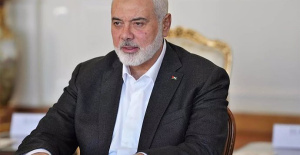MADRID, 14 Ago. (EUROPA PRESS) -
Ciudadanos has presented to the Table of the Congress of Deputies a parliamentary initiative to ask the Government if it has prepared an economic impact report on the Intergenerational Equity Mechanism (MEI) of the public pension system.
The initiative, promoted by the deputy María Muñoz and collected by Europa Press, updates the one presented a year ago for the same reason, although the MEI had not yet been agreed upon at the time. The Government then replied that it would be established "after negotiation within the framework of social dialogue" and that at the moment "the corresponding studies and reports" were being carried out.
In the statement of reasons for the new parliamentary initiative, Ciudadanos points out that it was "an implausible response in all its extremes" and questions that the MEI was negotiated "without even an approximate estimate of what each of the proposed models.
Ciudadanos also criticizes the fact that the MEI was introduced in the pension system reform bill "in a totally inappropriate manner and with absolute disdain for parliamentary work."
With its approval and entry into force in December 2021, as the Ciudadanos text recalls, Muñoz has once again asked the Government if it has prepared any economic report or economic impact study on the MEI and if it has finished the documents that it was preparing in July of last year.
The deputy has also sued the Executive if it is going to make the aforementioned studies and reports public.
The Government, UGT and CC.CO. reached an agreement in November 2021 to replace the Sustainability Factor of the 2013 pension reform with the MEI. The pact was rejected by the Spanish Confederation of Business Organizations (CEOE).
The Minister of Inclusion, Social Security and Migration, José Luis Escrivá, explained that month in the Toledo Pact Commission that the MEI, which will begin to be applied in 2023, will be a temporary, contingent, sequential, flexible and balanced mechanism. In addition, it has been designed following the recommendations of the Toledo Pact on Youth and Social Security (14), Reserve Fund (3) and Parliamentary Control, monitoring, evaluation and reform (21).
The MEI hopes to respond to the pensions of the 'baby boomers', one of the most populous cohorts. To do this, social contributions will be increased by 0.6 points, and will be divided into 0.5 points for companies and 0.1 points for workers over a period of ten years, with the intention of accumulating 40,000 million euros in a decade.
This tool will be a "safety valve that will only be activated if pension spending grows above forecast." For the minister, it is "essential that the reactivation of the Reserve Fund be linked to this elimination of improper Social Security expenses" and that from 2032 it undergoes "quarterly evaluations."

 Exploring Cardano: Inner Workings and Advantages of this Cryptocurrency
Exploring Cardano: Inner Workings and Advantages of this Cryptocurrency Seville.- Economy.- Innova.- STSA inaugurates its new painting and sealing hangar in San Pablo, for 18 million
Seville.- Economy.- Innova.- STSA inaugurates its new painting and sealing hangar in San Pablo, for 18 million Innova.- More than 300 volunteers join the Andalucía Compromiso Digital network in one month to facilitate access to ICT
Innova.- More than 300 volunteers join the Andalucía Compromiso Digital network in one month to facilitate access to ICT Innova.-AMP.- Ayesa acquires 51% of Sadiel, which will create new technological engineering products and expand markets
Innova.-AMP.- Ayesa acquires 51% of Sadiel, which will create new technological engineering products and expand markets Hamas views Israel's latest deal proposal in "positive spirit"
Hamas views Israel's latest deal proposal in "positive spirit" The Ibex 35 rises 0.22% mid-session driven by Aena (4.66) and Sabadell (4.57%)
The Ibex 35 rises 0.22% mid-session driven by Aena (4.66) and Sabadell (4.57%) STATEMENT: Selena Romero and Roberto Pérez winners of the 22nd Nacho Juncosa Memorial - International under-16 tennis tournament
STATEMENT: Selena Romero and Roberto Pérez winners of the 22nd Nacho Juncosa Memorial - International under-16 tennis tournament STATEMENT: DH2 Energy is the winner in the first European renewable hydrogen auction
STATEMENT: DH2 Energy is the winner in the first European renewable hydrogen auction How Blockchain in being used to shape the future
How Blockchain in being used to shape the future Not just BTC and ETH: Here Are Some More Interesting Coins Worth Focusing on
Not just BTC and ETH: Here Are Some More Interesting Coins Worth Focusing on UPV students design an app that helps improve the ventilation of homes in the face of high temperatures
UPV students design an app that helps improve the ventilation of homes in the face of high temperatures Ivace and promotes a less invasive device for the early detection of prostate cancer
Ivace and promotes a less invasive device for the early detection of prostate cancer Valencia unanimously approves the ordinance to allocate spaces to test innovative initiatives
Valencia unanimously approves the ordinance to allocate spaces to test innovative initiatives UPV researchers promote a paid master's degree as a "talent factory" in integrated photonics
UPV researchers promote a paid master's degree as a "talent factory" in integrated photonics A million people demonstrate in France against Macron's pension reform
A million people demonstrate in France against Macron's pension reform Russia launches several missiles against "critical infrastructure" in the city of Zaporizhia
Russia launches several missiles against "critical infrastructure" in the city of Zaporizhia A "procession" remembers the dead of the Calabria shipwreck as bodies continue to wash up on the shore
A "procession" remembers the dead of the Calabria shipwreck as bodies continue to wash up on the shore Prison sentences handed down for three prominent Hong Kong pro-democracy activists
Prison sentences handed down for three prominent Hong Kong pro-democracy activists ETH continues to leave trading platforms, Ethereum balance on exchanges lowest in 3 years
ETH continues to leave trading platforms, Ethereum balance on exchanges lowest in 3 years Investors invest $450 million in Consensys, Ethereum incubator now valued at $7 billion
Investors invest $450 million in Consensys, Ethereum incubator now valued at $7 billion Alchemy Integrates Ethereum L2 Product Starknet to Enhance Web3 Scalability at a Price 100x Lower Than L1 Fees
Alchemy Integrates Ethereum L2 Product Starknet to Enhance Web3 Scalability at a Price 100x Lower Than L1 Fees Mining Report: Bitcoin's Electricity Consumption Declines by 25% in Q1 2022
Mining Report: Bitcoin's Electricity Consumption Declines by 25% in Q1 2022 Oil-to-Bitcoin Mining Firm Crusoe Energy Systems Raised $505 Million
Oil-to-Bitcoin Mining Firm Crusoe Energy Systems Raised $505 Million Microbt reveals the latest Bitcoin mining rigs -- Machines produce up to 126 TH/s with custom 5nm chip design
Microbt reveals the latest Bitcoin mining rigs -- Machines produce up to 126 TH/s with custom 5nm chip design Bitcoin's Mining Difficulty Hits a Lifetime High, With More Than 90% of BTC Supply Issued
Bitcoin's Mining Difficulty Hits a Lifetime High, With More Than 90% of BTC Supply Issued The Biggest Movers are Near, EOS, and RUNE during Friday's Selloff
The Biggest Movers are Near, EOS, and RUNE during Friday's Selloff Global Markets Spooked by a Hawkish Fed and Covid, Stocks and Crypto Gain After Musk Buys Twitter
Global Markets Spooked by a Hawkish Fed and Covid, Stocks and Crypto Gain After Musk Buys Twitter Bitso to offset carbon emissions from the Trading Platform's ERC20, ETH, and BTC Transactions
Bitso to offset carbon emissions from the Trading Platform's ERC20, ETH, and BTC Transactions Draftkings Announces 2022 College Hoops NFT Selection for March Madness
Draftkings Announces 2022 College Hoops NFT Selection for March Madness



























